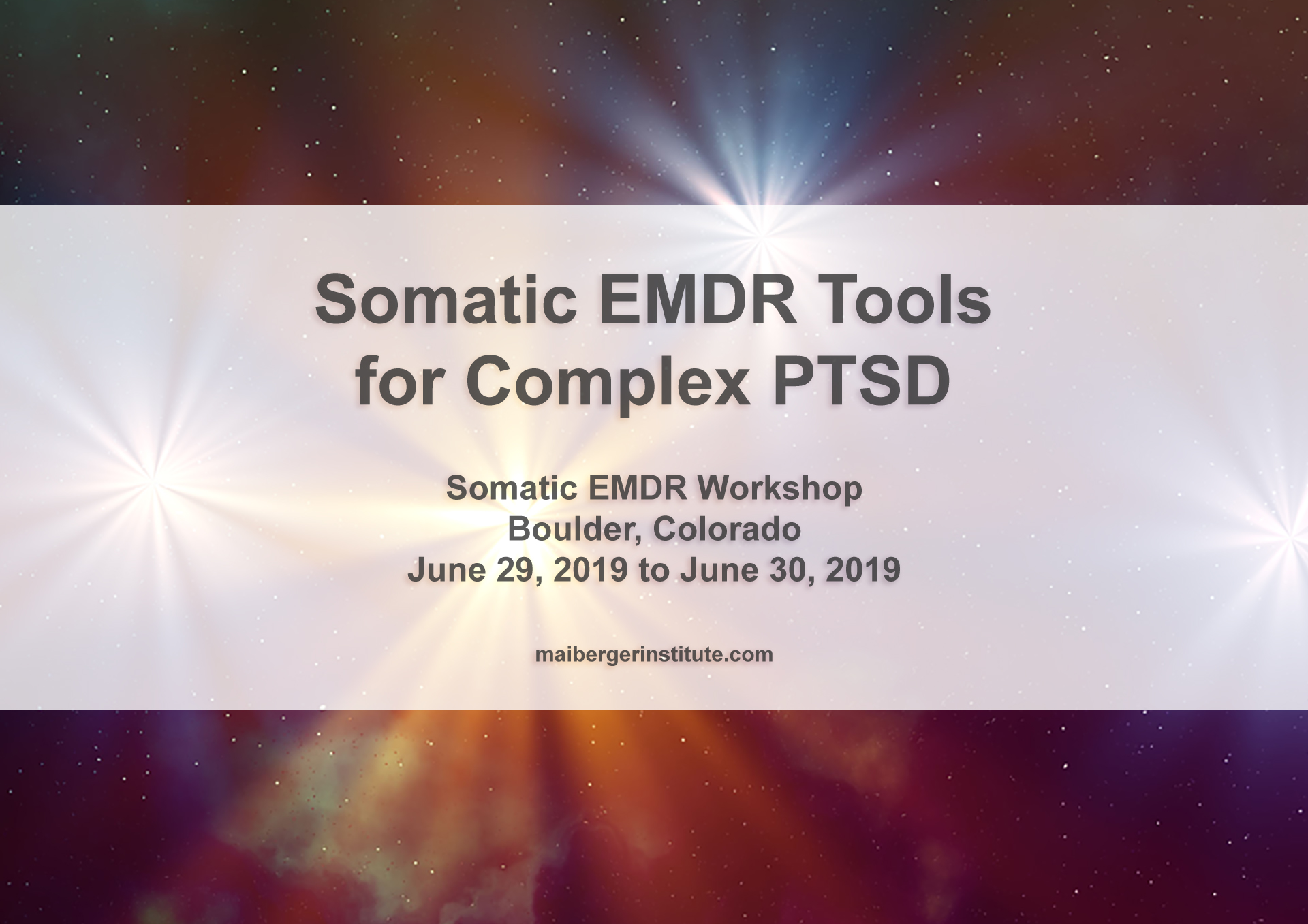-
Somatic EMDR Tools for Complex PTSD - Somatic EMDR Workshop in Boulder, Colorado - June 29-30, 2019
June 29, 2019 - June 30, 2019
8:30 am - 4:30 pm
Somatic EMDR Tools for Complex PTSD
- Somatic EMDR Workshop
- Boulder, Colorado
- June 29, 2019 (Saturday) to June 30, 2019 (Sunday)
- APA, EMDRIA, and NBCC CE Credit Hours Available
This Somatic EMDR Workshop — taught by Barb Maiberger, MA, LPC and Katie Asmus, MA, LPC, BMP — is designed to help EMDR therapists understand the unique importance of EMDR readiness when working with Complex PTSD. Over the years, we have witnessed therapists struggling to resource their clients with “Safe Place” which is an essential skill for EMDR therapy. Clients who have experienced neglect, abandonment, abuse in their early stages of development may have a limited capacity to tolerate emotions and body sensations. Trying to apply the EMDR therapy trauma protocol with clients with Complex PTSD too soon can lead clients to dissociate, shut down treatment and never want to do EMDR therapy ever again. Slowing down the preparation phase and integrating creative multifaceted approaches is key to implementing EMDR therapy successfully with Complex PTSD. Somatic and other sensory resourcing tools are explored to help clients feel more in control allowing them to deepen their connection to the body while staying present in a safe way. When clients develop a better sense of control around their distress, treatment can proceed in a gentler way.
Trainers for this Somatic EMDR Workshop:
Venue for this Somatic EMDR Workshop:
Best Western Plus Boulder Inn
770 28th St
Boulder, Colorado 80303
(directions)
Enrollment and Payment
Price quoted on the Registration Form is the payment amount due at time of registration, and automatically adjusted for fees and discounts in real-time.
SUPER EARLY BIRD PRICE: $330 (Expires March 15, 2019 )(EXPIRED)EARLY BIRD PRICE: $360 (Expires May 10, 2019)(EXPIRED)- Regular Price: $390
Seat availability is updated automatically in real-time. We do not maintain a waitlist. If registration is closed, has expired, or if seats are full, please subscribe to our EMDR Therapy Newsletter to receive updates on the availability of future workshops.
Workshop Schedule
Workshop will begin and end on time. Please plan accordingly.
June 29, 2019 – Saturday:
- 8:30 am to 9:00 am — Doors Open/Check-in
- 9:00 am to 4:30 pm — Workshop
June 30, 2019 – Sunday:
- 8:30 am to 9:00 am — Doors Open/Check-in
- 9:00 am to 4:30 pm — Workshop
Somatic EMDR Workshop Requirements and Policies
By registering in this Somatic EMDR Workshop, you are indicating you have read the Participant Agreement, and (i) have determined you are eligible to participate in the chosen workshop, and (ii) explicitly agree to be bound by the terms and conditions in the Participant Agreement.
If you are unsure of your eligibility, please contact the Maiberger Institute before registration. If you do not agree to the terms and conditions in the Participant Agreement, do not register for this workshop.
Please email us if you have any questions regarding registration, eligibility, rates, etc.
Participant Agreement Eligibility Requirements Payment and Cancellation PoliciesHotels, Transportation, and Meals
Registrants are responsible for arranging their own travel (accommodations, transportation, and meals). Registration Fee for this workshop does not include cost of travel. The Maiberger Institute is not liable for refunds for travel expenses due to cancellations.
If you happen to be interested in staying at the Best Western Plus Boulder Inn, please contact Ari Rubin for assistance:
- [email protected]
- (303) 449-3800
Group code: call 800-233-8469 and reference code “Maiberger Institute”
Arrival Date: Friday, June 28, 2019
Departure Date: Sunday, June 30, 2018
Click Book a Room with Best Western Boulder Inn
Otherwise, therapists can use their favorite travel websites such as Hotels.com, Orbitz.com, or even GoogleMaps to make travel accommodations.
Venue: Best Western Plus Boulder Inn
Address:
Description:
Best Western Plus Boulder Inn
770 28th Street
Boulder, Colorado 80303






